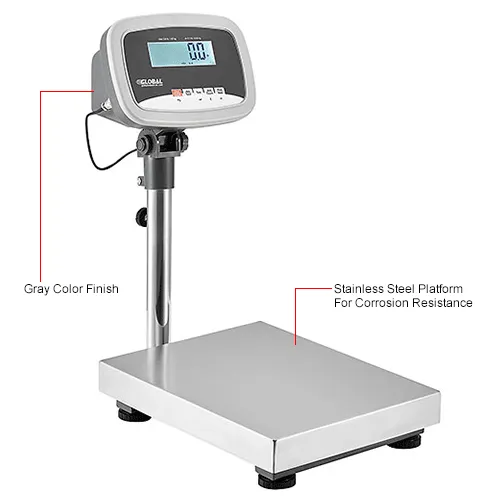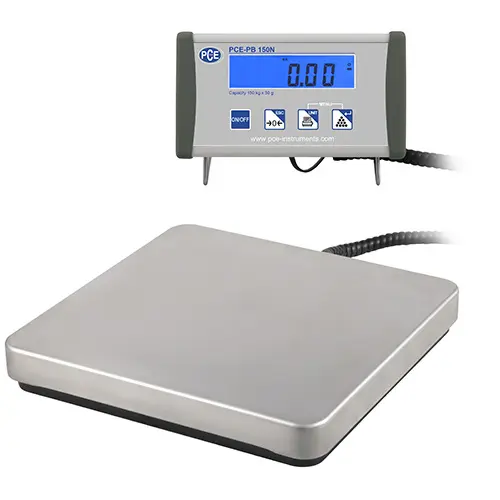Digital vs. Analog Industrial Scales: What You Need to Think about
Digital vs. Analog Industrial Scales: What You Need to Think about
Blog Article
Exactly How Industrial Scales Improve Precision in Production and Logistics
Industrial ranges are indispensable to the accuracy required in manufacturing and logistics, as they directly affect the precision of weight dimensions necessary for reliable production and stock practices. Industrial Scales. By ensuring that materials are considered properly, organizations can reduce errors that can bring about significant economic consequences. The arrival of advanced technologies in evaluating systems is changing conventional procedures. Nevertheless, recognizing the full extent of these improvements and their implications for future operations invites a more detailed assessment of exactly how evolving techniques can redefine accuracy standards in the market.
Importance of Accuracy in Operations
In the world of manufacturing and logistics, precision is the foundation of operational effectiveness. Accurate dimensions are important for keeping high quality control, optimizing source allowance, and making sure conformity with market requirements. When operations depend on accurate data, businesses can minimize waste, enhance manufacturing timelines, and improve general performance.
The significance of accuracy prolongs beyond basic dimension; it likewise affects decision-making processes. Precise weight analyses can establish proper stock levels, enhance supply chain logistics, and assist in accurate invoicing. In addition, errors in dimensions can lead to expensive mistakes, such as overproduction or undervaluing product requirements, which can jeopardize task timelines and earnings.
By implementing rigorous dimension requirements, organizations can recognize inadequacies and pass improvements, ultimately leading to boosted client complete satisfaction. Thus, spending in precision measurement devices, such as industrial scales, is not just a technical factor to consider however a tactical important for success in the production and logistics markets.
Types of Industrial Scales
Numerous sorts of industrial ranges play an important role in attaining the precision essential for reliable manufacturing and logistics procedures. Each type is made to satisfy particular needs, making certain precise measurement of components, products, and items.
One usual kind is the system scale, which provides a flat surface for weighing huge things or bulk products. These ranges are frequently used in warehouses and delivery facilities. One more kind is the bench scale, normally smaller and used for considering private bundles or smaller sized batches of items. These scales are vital in quality control processes. Industrial Scales.
For applications where precision is crucial, analytical balances are utilized. These high-accuracy scales are utilized in labs and research study setups to determine tiny amounts with utmost accuracy. Flooring scales, developed for durable evaluating, are optimal for evaluating big pallets or containers, typically integrated with forklifts for effectiveness.
In addition, tons cells are utilized in various applications for real-time weight measurement and data collection. Each of these ranges adds distinctly to the functional effectiveness, making sure that organizations can keep precision throughout their production and logistics procedures. Recognizing the kinds of industrial scales is necessary for optimizing performance and achieving operational quality.

Influence On Inventory Administration
Accurate evaluating is important for effective inventory management, as it directly affects supply precision and functional efficiency. In manufacturing and logistics, accurate dimension of items and products ensures that inventory records mirror real stock levels, minimizing discrepancies that can lead to overstocking or stockouts. Industrial scales supply the essential accuracy to consider items precisely, making it possible for businesses to maintain a trustworthy supply system.
Moreover, exact weighing adds to much better projecting and preparation. With precise data on inventory levels, companies can make enlightened choices concerning procurement and manufacturing this contact form schedules. This minimizes the danger of excess stock, which can tie up capital and boost storage expenses, in addition to stop lacks that might interrupt operations.
Furthermore, the assimilation of commercial ranges with stock monitoring systems helps with real-time tracking of stock activities. This enhances the procedure of upgrading inventory documents, enhancing transparency and responsibility throughout the supply chain. Inevitably, accurate weighing not only sustains efficient inventory monitoring but also drives general operational effectiveness, enabling organizations to respond promptly to market needs and preserve an affordable edge in their corresponding industries.
Enhancing Quality Assurance
Effective stock management not just ensures ideal supply levels however additionally lays the groundwork for durable quality assurance processes. Industrial ranges play a critical function in boosting quality assurance by giving accurate weight measurements that are essential for preserving item integrity. Constant weight confirmation makes it possible for producers to follow requirements, guaranteeing that each thing fulfills the required high quality criteria.
In high-stakes settings, such as food production or pharmaceuticals, even minor weight disparities can lead to considerable conformity concerns. By incorporating industrial scales into the assembly line, business can check product weights in real time, enabling instant restorative activities if irregularities are identified. This proactive method lessens waste and improves general item integrity.
In addition, exact considering promotes far better solution Industrial Scales of raw products, which is crucial in industries such as cosmetics and chemicals. By guaranteeing that component ratios remain constant, makers can accomplish remarkable item high quality, improving client contentment and lowering returns.
Future Trends in Weighing Technology
The future of considering modern technology is positioned for significant advancements driven by automation, connectivity, and information analytics. As sectors advance, the assimilation of innovative sensing units and IoT (Web of Things) capabilities will certainly allow real-time tracking and reporting of weight information. This connection will certainly not just enhance functional performance but additionally assist in anticipating maintenance, reducing downtime and boosting efficiency.
Additionally, the incorporation of expert system and maker knowing formulas right into evaluating systems will improve data analysis capacities. These technologies can determine anomalies and patterns, enabling for even more informed decision-making and enhanced supply chain management. Additionally, the surge of cloud-based solutions will make it possible for seamless data sharing across systems, making sure that stakeholders have accessibility to up-to-date info in all times.
Sustainability will likewise play an important duty in future evaluating modern technology. As companies aim to decrease their carbon footprint, weighing systems that integrate energy-efficient styles and products will certainly end up being significantly important. Additionally, developments in digital evaluating ranges will certainly sustain far better resource administration by supplying specific dimensions that lower waste.
Conclusion
Finally, industrial scales considerably improve precision in production and logistics by supplying accurate weight measurements necessary for reliable procedures. Their function in stock administration, high quality control, and combination with sophisticated innovations highlights their significance in optimizing and reducing inconsistencies resource allotment. As industries remain to progress, the fostering of cutting-edge evaluating options will further sustain functional efficiency and lower waste, inevitably adding to enhanced productivity and competition in the market.
One common kind is the system his comment is here scale, which gives a flat surface area for considering bulk materials or huge products. An additional kind is the bench scale, commonly smaller sized and used for considering individual plans or smaller sets of items. Floor ranges, developed for sturdy weighing, are suitable for evaluating large pallets or containers, commonly integrated with forklifts for effectiveness.
Industrial ranges offer the essential precision to evaluate things precisely, enabling services to keep a trustworthy inventory system.

Report this page